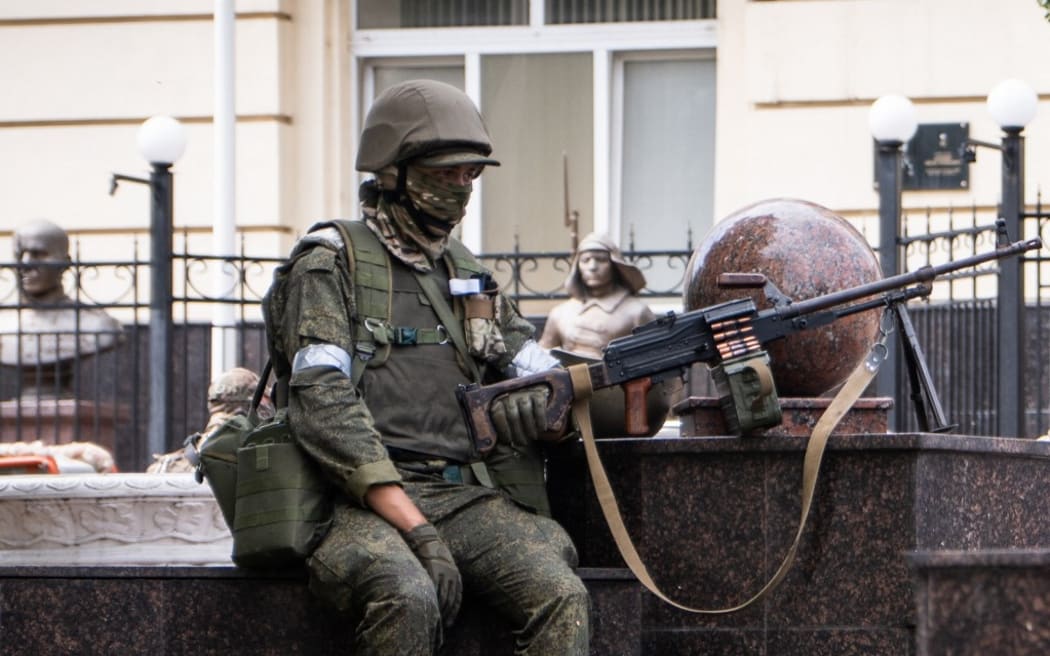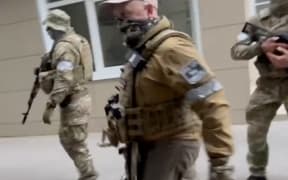
A member of Wagner group stands guard in Rostov-on-Don, on June 24, 2023. Photo: AFP / Roman Romokhov
The New Zealand Embassy in Moscow was not evacuated as mercenaries marched on the city in June because officials considered the risks were not sufficient.
However, they have since reviewed the trigger points for an evacuation, though are refusing to disclose if they have been changed.
The Wagner group marched to within 200km of Moscow on 23 June, and shot down six aircraft on the way, before boss Yevgeny Prigozhin called an abrupt halt, turning aside from "the moment ... when blood could be spilled".
Russian President Vladimir Putin had said the mutiny had to be decisively put down.
Prigozhin, reported on Thursday (NZ time) as dying in a plane crash, had pledged to oust the army's top brass and "restore justice".
The Ministry of Foreign Affairs and Trade knew of 43 New Zealanders in Russia at the time - none asked for help to get out, or advice, it said in a response to an Official Information Act (OIA) request this week.
This included some heavily redacted online chat, where someone offered to provide planning help - presumably to the embassy - even if only "to cover off or sanity check any aspect".
In its response, MFAT told RNZ: "No group was evacuated or moved out after the Wagner group began its march on Moscow.

This video grab taken from a handout footage posted on May 5, 2023 on Telegram shows Yevgeny Prigozhin addressing the Russian army's top brass. Photo: HANDOUT / AFP
"Generally, evacuation of staff and other New Zealanders, such as contractors, is not our process unless there is specific knowledge of sufficient risk to justify this step.
"In the case of the Wagner group beginning its march on Moscow… we did not have information that suggested this was necessary."
However, the OIA response showed the ministry updated the embassy's emergency plans straight after the uprising, and then revisited the evacuation trigger points.
An 'MFAT response' update from the week of June 30 said: "As events in Russia quickly unfolded on Saturday morning NZT [June 24], ministry processes were triggered.
"The embassy in Moscow initiated its contingency planning and Europe Division remains in close contact with the embassy as the situation evolved."
RNZ asked the ministry if it was waiting for other countries to evacuate their embassies, but it said no.
"The ministry generally learns from and shares information with our counterparts. Each country has a different risk tolerance and profiles, so although the movements of other embassies is considered, their evacuation is not necessarily a trigger for New Zealand to do the same."
Following a "lessons learned exercise", the embassy's emergency plans were updated, "with a focus on staff and dependent well-being should the domestic security situation in Russia further deteriorate", the 30 June update said.
The ministry had contingency plans for events that posed a risk to staff and operations anywhere, but could not share specifics for security reasons, it told RNZ.
The OIA showed it had also looked beyond those plans.
"Following the Wagner event, the ministry revisited the triggers that were in place to consider whether any changes should be made," it said.
MFAT would not say if any change to the triggers - comprising the political climate, access to food, medicines and banking, access to power, water, communications and transport and the security climate - would be made.
"Identified triggers reflect the fact that the health, safety and wellbeing of our staff is a priority.
"For security reasons, we are unable to disclose specific triggers or changes made to them. Disclosure of this information would risk endangering ministry staff in the event they are relied upon."
It had no record of the ambassador or any senior officials raising concerns about the evacuation triggers, and there had been no ministerial briefings about what happened, MFAT said.
The random scatterings of blanked-out online chat include someone saying: "... we should keep a watch on whether that is sensible".
And on 25 June at 7am: "I know [BLANK] has a close eye on the ball ... I can certainly help devise a 'plan B' extension to the current approach.
"... I appreciate that there will be a lot on at the moment, and plenty of communication rolling in from all directions, so I'll fall back into the central SORD comms rather than add to that burden. However, if you do wish for any planning support or assistance in revising/refreshing/or consolidating what is already in place, then please don't hesitate to shout out."
Extra New Zealanders were at the embassy at the time, builders working on a $25m renovation project.
"Whether there were contractors on site would not be determinative in the decision to evacuate, because MFAT makes no differentiation between staff and contractors when it comes to matters of decisions on safety and wellbeing," the ministry said.
Contractor Naylor Love had workers at the renovation last year, but not in June. It pulled its workers out when Russia invaded Ukraine in early 2022, then sent them back in for a time, it said.
The renovation prompted criticism of the government from the National Party last year, saying it was "perplexing" to carry on amid a war.
The renovation relied on materials shipped in sealed containers from New Zealand for security reasons.
During the coup march, the US Embassy in Moscow said it was "aware of the reports of fighting between Wagner Group forces and the Russian Armed Forces in southwest Russia. The security situation in Russia continues to be unpredictable. We will continue to monitor the situation."








